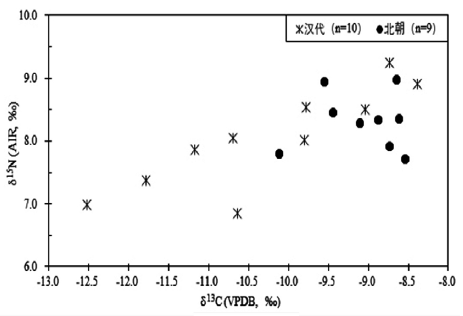

收稿日期: 2018-02-01
网络出版日期: 2020-07-17
基金资助
国家自然科学基金(41373018);国家自然科学基金(41773008);国家基础研究项目(2015CB953803);国家社科基金重大项目(11&ZD182);国家社科基金青年项目(16CKG013)
Ethnic fusion in North China from Han Dynasty to Northern Dynasties: Stable isotope analysis of human bones from the Xitun cemetery, Beijing
Received date: 2018-02-01
Online published: 2020-07-17
探讨农耕民族与游牧民族之间的相互交融和融合,对揭示中华民族的形成和发展过程极具重要意义。目前,历史文献与人群体质特征的研究,为了解华北地区东周以后人群的混合和交流提供了丰富的线索,但在民族交融过程中生存方式的转变及其对人群健康的影响尚缺乏细致地研究。为此,本文以北京延庆西屯村墓地汉魏时期的人骨为对象,对其开展C、N稳定同位素分析,并紧密结合体质人类学研究成果及历史文献,揭示自汉至北朝期间先民生存方式的变迁及对人群健康状况的影响。研究表明,先民食物中包含大量的C4类,反映了粟黍农作物种植业在先民生存方式中占有重要地位;自汉至北朝,先民的δ 13C值明显升高,可能与民族融合进程中统治阶级对农业经济的重视和多项利农措施的实施密切相关;而北朝时期人群死亡高峰的推后及女性平均身高的增高,则可能与农业经济的发展改善人群的营养健康相关。本文通过对人骨稳定同位素的分析与人骨体质特征的有机结合,为揭示我国民族间融合进程中人群生存方式的变迁及健康状况提供了新的研究视角。

朱思媚 , 周亚威 , 朱泓 , 丁利娜 , 胡耀武 . 华北民族融合进程中人群生存方式及对健康的影响 ——以北京延庆西屯村墓地为例[J]. 人类学学报, 2020 , 39(01) : 127 -134 . DOI: 10.16359/j.cnki.cn11-1963/q.2018.0026
The study of genetic admixture of nomads and farmers is significant in understanding the beginnings of the Chinese nation. Anthropology and historic research on North China give us a variety of information about human admixture and ethnic mixing in this area, and yet during this period, the impact of subsistence strategy shifts on human health is unclear. Stable isotope analysis (C & N) of human bones were undertaken from the Xitun cemetery (~200BC-580AD) located in Yanqing, Beijing, in combination with evidence from morphological study on human skeletons and historical records in order to discuss possible influences of the health of the ancient population when subsistence shifts appeared. Results show that people mostly consumed C4-based foods during both periods, which means millet agriculture played an important role. Compared with people living during in Han Dynasty, residents in the Northern Dynasties had a higher δ 13C value, which could be closely related to agricultural measures implemented by governments during the ethnic mixing process. Increasing females height and changing death statistics in the Northern Dynasties indicate that development of agriculture may have had unexpected effects on people’s health. In our research, stable isotope analysis and physical anthropological methods provide a new aspect in understanding the fusion of mixing of ancient ethnic groups and thus reflect the beginnings of the Chinese nation.

Key words: Ethnicity; Isotopes; Nutrition; Physical anthropology; Cemetery
| [1] | 何星亮 . 中国历史上民族融合的特点和类型[J]. 中南民族大学学报:人文社会科学版, 2010(2):35-43 |
| [2] | 史金波 . 历史上华北地区的民族变迁[J]. 河北学刊, 2011(4):75-81 |
| [3] | 左丘明 . 左传[M]. 长沙:岳麓书社, 1988: 184-185 |
| [4] | 左丘明 . 左传[M]. 长沙:岳麓书社, 1988: 42 |
| [5] | 司马迁 . 史记[M]. 北京: 中华书局, 1959: 1439 |
| [6] | 魏收 . 魏书[M]. 北京: 中华书局, 1974: 536 |
| [7] | 朱泓 . 蔚县夏家店下层文化颅骨的人种学研究[J]. 北方文物, 1987(1):4-13, 22 |
| [8] | 汪洋 . 藁城台西商代居民的人种学研究[J]. 文物春秋, 1996 (4): 16-20, 22-24 |
| [9] | 周亚威 . 北京延庆西屯墓地人骨研究[D]. 吉林大学, 2014 |
| [10] | Schrenk A, Gregoricka LA, Martin DL , et al. Differential diagnosis of a progressive neuromuscular disorder using bioarchaeological and biogeochemical evidence from a bronze age skeleton in the UAE. International Journal of Paleopathology, 2016,13:1-10 |
| [11] | Zari?a G, Sholts SB, Tichinin Tichinin , et al. Cribra orbitalia as a potential indicator of childhood stress: Evidence from paleopathology, stable C, N and O isotopes, and trace element concentrations in children from a 17th-18th century cemetery in Jekabpils, Latvia. Journal of Trace Elements in Medicine and Biology, 2016,38:131-137 |
| [12] | Dong Y, Morgan C, Chinenov Y , et al. Shifting diets and the rise of male-biased inequality on the Central Plains of China during Eastern Zhou, PNAS, 2017,114(5):932 |
| [13] | 北京市文物研究所,延庆县文物管理所. 北京市延庆县西屯墓地西区(I区)考古发掘简报[J]. 北京文博, 2012(4):19-30 |
| [14] | 朱志刚, 丁利娜, 张中华 , 等. 北京市延庆县西屯墓地东区(II区)考古发掘简报. 文物春秋, 2018(3):31-39 |
| [15] | Price TD, Blitz J, Burton J , et al. Diagenesis in prehistoric bone: problems and solutions[J]. J ArchaeolSci, 1992,19(5):513-529 |
| [16] | Ambrose SH . Preparation and characterization of bone and tooth collagen for isotopic analysis[J]. J ArchaeolSci, 1990,17(4):431-451 |
| [17] | Calvin MB . The path of carbon in photosynjournal[J]. Science, 1962(107):476-480 |
| [18] | 于德源 . 北京古代农业的考古发现(续)[J]. 农业考古, 1990(2):138-143 |
| [19] | 司马迁 . 史记[M]. 北京: 中华书局, 1959: 3265 |
| [20] | 范晔 . 后汉书[M]. 北京: 中华书局, 2007: 324 |
| [21] | 陈寿 . 三国志[M]. 北京: 中华书局, 1959: 463-464 |
| [22] | 高原 . 魏晋南北朝北方农业耕作方式与人口关系之探讨[J]. 中国经济史研究, 1995(1):c68-78 |
| [23] | 蒋福亚 . 魏晋南北朝北方的农业耕作方式[J]. 首都师范大学学报:社会科学版, 1999(1):24-29 |
| [24] | 缪启愉 . 齐民要术校释[M]. 北京: 农业出版社, 1982: 15 |
| [25] | 魏收 . 魏书[M]. 长春: 吉林人民出版社, 1995: 1664 |
| [26] | 张宝秀 . 北京——中原与北方民族文化融合的中心[J]. 北京联合大学学报, 2000(1):37-41 |
| [27] | 周亚威 . 北京地区古代人群身高的研究[J]. 天津师范大学学报:自然科学版, 2017,37(3):62-64, 80 |
| [28] | 蓝建芳 . 学龄前儿童微量元素及营养摄入对身高体重的影响[J]. 中华全科医学, 2017(2):274-276 |
| [29] | 王建华 . 黄河流域史前人口健康状况的初步考察[J]. 考古, 2009(5):61-69 |
/
| 〈 |
|
〉 |